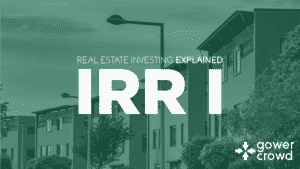FREE TRAINING
What is Real Estate Crowdfunding?
Learn how to build wealth and earn passive income in real estate while someone else does all the work.
Sponsor Fees and the Motivating Factor in Real Estate Investing
By Adam Gower Ph.D.
When looking at any real estate deal with a sponsor, understanding the principals’ motivation for why they are doing a particular transaction is a key consideration prudent investors should keep in mind.
The best sponsors will be able to articulate clearly the strengths and weaknesses of the opportunity and will demonstrate to investors that real estate is their passion, that they are experts at creating value by buying real estate, and that their overriding goal is to create value.
In common with other industries, however, some sponsors’ business models are driven largely by fees and while charging fees is an important part of running a real estate development business, it is not in investors’ best interest that they drive developer motivation.
There are many fees that can be charged to a project and this article considers how investors can assess the underlying developer modus operandi.
Acquisition Fees
Looking at a balance between fees and performance motivators is the process of making sure that sponsors’ interests are aligned with the investors.
And part of that is how the sponsor co-investment tallies with their upfront acquisition fees.
Investors want to see that the sponsor has skin in the game proportionate with the size of the deal and the wealth of the sponsor.
A sponsor is going to be increasingly motivated the more actual money it has in the real estate deal.
But fees and co-investment are related because it is the net sponsor co-investment in a transaction or an acquisition that measure alignment of interest.
If a sponsor signals that they are going to put in 10% of the equity that might seem like a respectable co-invest. However, looking deeper, there may be an acquisition fee that equals or exceeds the co-investment amount.
The net effect of this is that while the sponsor is putting money in to the deal, on day one, they’re also taking money out immediately. In these cases, the sponsor may not have any net co-investment in the deal.
Ensuring there is no disconnect between the sponsor's co-invest and their upfront acquisition fees helps in identifying an alignment of interest between investors and sponsor.
Get access to our FREE weekly newsletter exclusively covering the latest updates from the real estate crowdfunding world
Asset Management Fees
Another type of fee often charged is the asset management fee.
This can be based on a percentage of equity under management, which is common, and sometimes the fee is based on percentage of total asset value which will be a lot higher than percentage of equity because it also includes a fee for managing any debt.
More aligned with investor interest, but less often seen, are fees that are performance based.
For example where it is calculated on a percentage of effective gross income instead of just a flat percentage of equity.
It is generally in investor best interest to tie fees to some performance metric because if the performance of the asset goes down the sponsor gets less asset management fee but when it goes up and they're making distributions and doing a great job for their investors, it goes higher.
Fees that reward this mentality are more desirable than those based solely on sheer volume of assets under management.
Similarly, investors might prefer a sponsor looking for a higher promote in lieu of a disposition fee.
A disposition fee will yield a sponsor revenue even if they sell a property at a loss because they still get a percentage of the sale proceeds whereas if it's bonus driven by a promote they have to exceed a hurdle in order to be compensated.
Sources and Uses
Ideally when raising capital for a real estate investment opportunity, sponsors will provide a section in the offering documents that clearly lays out all the fees they are going to be earning, no matter what the source, to ensure complete transparency.
However, offering documents can be long and complicated and if such a summary is absent, a diligent investor will need to dig to find where fees may be buried.
This treasure hunt could include looking not only at the operating documents but also in property management agreements and this is why: Prior to a project acquisition closing, people submit invoices to the escrow company and then once it closes, money is dispersed.
Reputable, transparent sponsors will provide a full accounting of all closing expenses and summarize exactly what they will be ahead of time for investors in a summary of sources and uses of funds.
Investors can compare this summary with the settlement statement the escrow company provides to make sure they are consistent.
***
Looking at how the fees in a deal are aligned with making sure that the sponsor’s actually going to execute and maximize investor returns is a key part of any investor’s deal due diligence.
Fees are necessary and to be expected, but they shouldn’t be the driving motivation for the sponsor.
Seeking a balance between sponsor co-invest, performance based rewards, and fees will help ensure a better alignment of interests with investors.
POSTED BY

ADAM GOWER PH.D.
Adam Gower is a 30+ year veteran real estate investment and finance professional. He expands investor networks for real estate developers by implementing best-of-class digital marketing programs. Dr. Gower has written several books, the latest, Leaders of the Crowd, chronicles the legislative origins of crowdfunding and how real estate came to dominate the industry.
This article is dedicated to my friend, Ed Mansell whose intellect was matched only by his humility and humanity. He will be missed by all.
Newbie
If you want to build your wealth and earn passive income from real estate investing and are looking at deals on marketplace platforms or through developers online, then I recommend you start by the 8 Key Financial terms so you can understand every deal you look at.
The 8 Financial Keys are not only a great way to get started, they are also essential to understanding how you’ll make money in any real estate deal.
You’ll learn the most important financial concepts you need to know in real estate investing that apply to every type of real estate no matter the asset class (office, industrial, residential, hospitality, retail).
Intermediate Investor
If you’ve got some online real estate investments under your belt already and are beginning to receive passive income checks each month, or have been paid off with profit – or (hopefully not) are finding that some deals are not quite panning out the way you expected, then check out this page for a wealth of free resources.
Here I cover everything from beginner all the way to very advanced real estate concepts.
You’ll find podcasts with developers, researchers, professors and other industry experts, detailed articles, and lots of videos, both short and long that are all easily searchable and totally free.
Advanced Investors
I am not shy about being straightforward about real estate investing; it is exciting, lucrative, and can help you build wealth and income as part of your investment portfolio, but it is not without its risks.
As an advanced investor you know this already, so I’ve put together a webinar for you that guides you through one of the most important components of real estate investing: Real Estate Contracts – reading between the lines.
This is advanced learning and based off conversations I had with three of the top real estate attorneys in the country, combined with my own personal experience. Access it here; it could be the most important webcast you watch all year.





